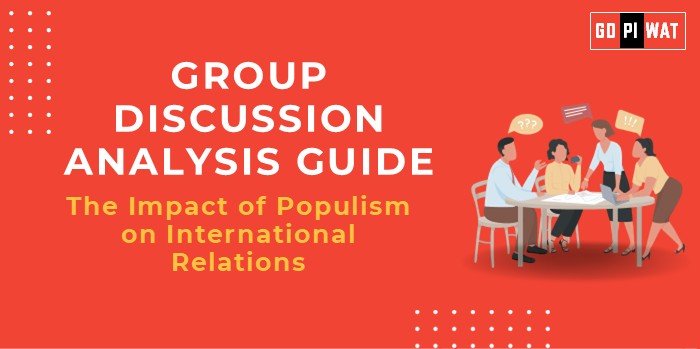📋 Group Discussion Analysis Guide: The Impact of Populism on International Relations
🌐 Introduction to the Topic
📖 Opening Context
Populism has reshaped political landscapes globally, influencing domestic policies and international diplomacy. Its rise has created polarized societies and introduced new challenges in international relations.
📜 Topic Background
Rooted in a rhetoric that opposes the elite and promotes national sovereignty, populism surged post-global financial crises (2008) and during major migrations (2010s). Leaders with populist agendas have questioned multilateralism and reshaped foreign policy priorities.
📊 Quick Facts and Key Statistics
- 🌍 Populist Leaders in Power (2024): Over 25 countries have populist-influenced governance, indicating a shift in global politics.
- 🚪 Migration Policies: 73% of populist governments adopt stricter immigration controls, impacting international agreements.
- 📉 UN Participation Index: Populist-led nations show a 15% lower engagement rate in UN resolutions.
- 📜 Trade Agreements: Populist governments renegotiate or withdraw from an average of 1.7 trade deals annually.
🤝 Stakeholders and Their Roles
- 🏛️ National Governments: Shape foreign policies based on nationalist interests.
- 🌐 International Organizations: UN, WTO, and similar bodies struggle to maintain multilateralism amidst resistance from populist nations.
- 👥 Citizens: Drive populism through electoral support for anti-globalization narratives.
- 💼 Corporations: Face economic uncertainty due to trade protectionism and isolationist policies.
🏆 Achievements and Challenges
✨ Achievements
- 🇺🇸 National Sovereignty: Empowered local industries by renegotiating global trade deals.
- 🎭 Cultural Preservation: Limited cultural homogenization through strict migration controls.
- 🗳️ Political Engagement: Increased domestic political involvement and voter turnout in populist nations.
⚠️ Challenges
- 🤝 Diplomatic Strains: Populist policies often undermine international treaties.
- 🌍 Global Inequality: Isolationist policies exacerbate disparities between developed and developing nations.
- 🔐 Security Risks: Reduced international cooperation hampers collective security efforts.
🌍 Global Comparisons
- ✅ Success: Hungary exemplifies national economic growth under populist policies but faces diplomatic criticism.
- ⚠️ Challenges: The U.S.-China trade war, intensified by populist policies, strained global trade relations.
📖 Case Study: Brexit
The UK’s populist movement led to Brexit, challenging the EU’s integration model while redefining economic and political ties.
💡 Structured Arguments for Discussion
- 🛠️ Supporting Stance: “Populism promotes sovereignty and protects national interests, fostering domestic economic growth.”
- 🛡️ Opposing Stance: “Populist policies disrupt global stability and reduce the efficacy of international organizations.”
- ⚖️ Balanced Perspective: “Populism addresses domestic discontent but must balance global cooperation.”
🎯 Effective Discussion Approaches
🔑 Opening Approaches
- 📈 Start with Data: “Populism’s rise globally has seen over 25 countries adopting populist governance models.”
- 📖 Case Study: “Brexit’s impact on EU dynamics highlights both the strengths and challenges of populist policies.”
⚙️ Counter-Argument Handling
- 🔄 Rebuttal: “Multilateral frameworks are essential to address global challenges despite nationalistic priorities.”
- ✅ Example: “Trade disruptions caused by protectionist policies can weaken long-term economic stability.”
🧠 Strategic Analysis of Strengths and Weaknesses
SWOT Analysis:
- 💪 Strengths: Enhanced political engagement, nationalistic pride.
- 🛠️ Weaknesses: Eroded multilateralism, heightened isolation.
- 🌟 Opportunities: Potential to reform ineffective global institutions.
- ⚠️ Threats: Global instability and economic protectionism.
🏫 Connecting with B-School Applications
📚 Real-World Applications
- 📊 Policy analysis and international business strategies.
🎓 Sample Interview Questions
- ❓ “How can populist policies affect global supply chains?”
- ❓ “Discuss populism’s influence on climate agreements.”
💡 Insights for Students
- 📈 Analyze the balance between domestic policies and global responsibilities.


